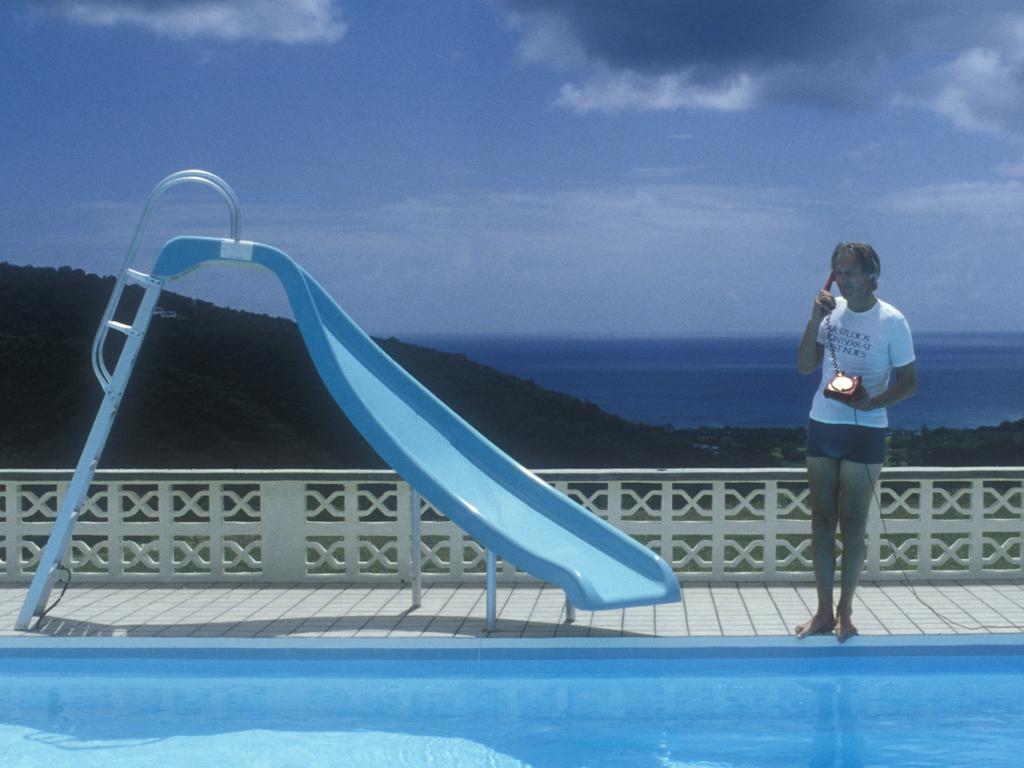Shihad’s 10th album Old Gods: beautifully brutal, and one of the NZ band’s best
Very few bands continue to write, record, release and perform relevant and vital works after 33 years. Shihad is one of those few.
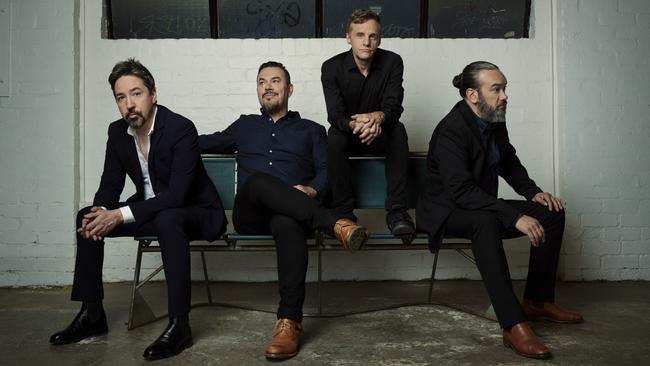
One Friday evening 10 years ago, Adam Spark witnessed a pure moment of live rock ’n’ roll mastery that still gives him goosebumps today.
On the first date of the 2011 Big Day Out tour in Auckland, Spark stood side of stage at Mt Smart Stadium to watch a band named Shihad perform.
The four musicians walked out as sunset was approaching, and before the remaining hours on the festival’s biggest stages were given over to three megawatt international headliners in Iggy and the Stooges, Rammstein and Tool.
Spark had played earlier that afternoon on a smaller side-stage with Birds of Tokyo, the rock band he co-founded in Perth in 2004. Now, off the clock and with a beer in hand, he settled in to watch Shihad perform in full its 1999 album The General Electric – an experience he describes as “Kiwi Armageddon”.
“It was remarkable, watching the crowd react to their favourite sons,” Spark tells Review. “It was absolutely electric, and everything you want from an atmosphere like that: the coalescence of the band, the crowd, the lights coming on, the sun going down and the heat. It was f--king amazing, watching that many arms all swinging, and feeling that energy – it’s something you try to take with you and carry into anything you do.”
Formed in Wellington in 1988, Shihad has held the same line-up since 1991. But while that 2011 gig offered a trip down memory lane for fans of its most commercially successful album, the same four musicians today are uninterested in merely retreading their past.
Instead, the group is making some of its strongest and most aggressive music. Across six weeks on the NSW Central Coast last year, the quartet tracked and recorded the songs that form its 10th album, Old Gods.
And Adam Spark is the producer who watched as it all unfolded, often wearing much the same expression of joy and satisfaction as he did on that evening a decade ago.
“It’s f..king Shihad, dude,” he says. “Standing in a room, listening to those guys play, I pretty much put microphones up, talked and argued with them a little bit over parts – and they played.”
With a laugh, he says, “It’s one of the greatest experiences in the studio I’ve ever had: sitting at the desk with my engineers, and we’re all there listening, looking at each other and going, ‘Yep – this is pretty good!’”
The producer’s role is sometimes overstated in music culture, but I’m using Spark’s involvement as a way into telling this story because he brought fresh ears to recording a band that has seen and done just about everything there is to do in the world of rock ’n’ roll.
Long established in New Zealand – having earned more Top 40 singles than any other local band – Shihad relocated to Melbourne in 1998 before the recording and release of The General Electric.
Later, ahead of making a tilt at the US rock market, the quartet changed its name to Pacifier – the title of one of its most popular singles – given the original sounded a bit too close to “jihad” in a post-September 11 world.
After one self-titled release under that name in 2002, the group reverted to Shihad. But to get caught up in the moniker malarkey is to miss the point, really, as the sound has remained largely the same.
I’ve also used Spark as an entry point here as we happen to share a belief that Shihad is one of the greatest rock bands of all time.
Big call, I know. There’s only a handful of artists in the world where I feel I need to lay my cards on the table in order to write about them with honesty, and this is one.
I’ve seen Shihad about 10 times since 2006 – as often as the group has played in Brisbane during that time, basically – and each time I’ve walked away giddy with elation at the sheer presence and power on display.
Propulsive, compelling and unrelenting, Old Gods is an extraordinary achievement that any band in the world would be proud to put its name to.
It arrives seven years after Shihad’s last release, 2014’s FVEY. Pronounced “five eyes” – the name of the intelligence alliance comprising Australia, New Zealand, Canada, the US and Britain – the album was produced by Jaz Coleman of British post-punk band Killing Joke, who acted as something between drill sergeant and orchestra conductor for those sessions.
Coleman’s relationship with the band dated back to the industrial metal sound of its 1993 debut Churn, and his role has become part of Shihad folklore.
Like FVEY, the new set sees the band continuing its experimentation with unusually down-tuned guitars to create an immense wall of sound in the bottom end.
At times, the harmonic effect is such that the three stringed instruments are in lock-step on some extremely dirty, guttural grooves.
Yet what saves the arrangements from collapsing into a muddy mess is the interplay between Jon Toogood – the singer/guitarist with an ear for writing surprising, anthemic melodies – and the unerring precision of drummer Tom Larkin.
It was the mutual love of Metallica, Slayer and AC/DC that saw these two Wellington High School students become fast friends, then Shihad co-founders in 1988.
Toogood recently turned 50 and Larkin isn’t far behind him, but what the quartet – which is completed by guitarist Phil Knight and bassist Karl Kippenberger – has achieved with its 10th album is all the more surprising for the fact that it comes more than three decades into its recording career.
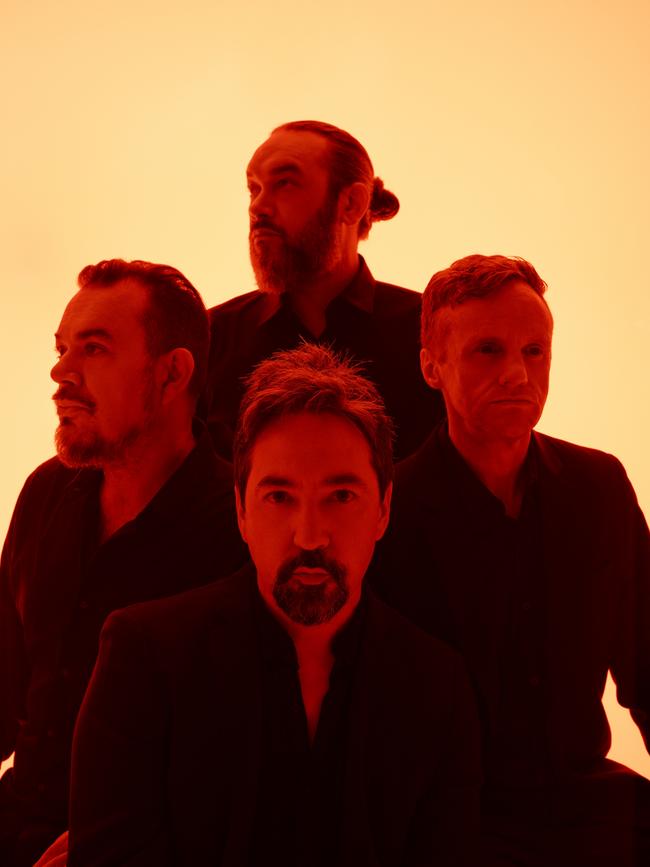
Very few groups of musicians continue to write, record, release and perform such relevant and vital works at this point in their shared relationship. After 33 years, most exist purely on the smell, look and feel of their fans’ nostalgia – if they’re together at all.
Only a handful of comparable analogs come to mind for such an enduring and productive run of creativity, and they’re all hard-hitting American bands with a heavy metal edge: Metallica, Tool and Deftones, which released debut albums in 1983, 1993, and 1995, respectively.
Like these three acts, Shihad has lived through creative misfires: with the benefit of hindsight, Beautiful Machine (2008) and Ignite (2010) both stand out as comparatively weak offerings amid an otherwise formidable discography.
Great artists grow, though, rather than wither. According to Toogood, the down-tuned guitars – a trick they borrowed from fellow Kiwi rock band The Mint Chicks – were the key that unlocked this late-career run of form.
“That tuning really opened up a world of utilising the fact that we’re at our best when we make powerful, heavy music – stuff that makes the body move,” says the singer. “That’s just our forte.
“We’ve made pop records, records tinged with electronic stuff, straight speed-metal records, industrial records – we’ve been through it all,” says Toogood.
“But with FVEY, Jaz reminded us what we did well, which was making really heavy, riff-based, groovy music, and that just flows on into this record.”
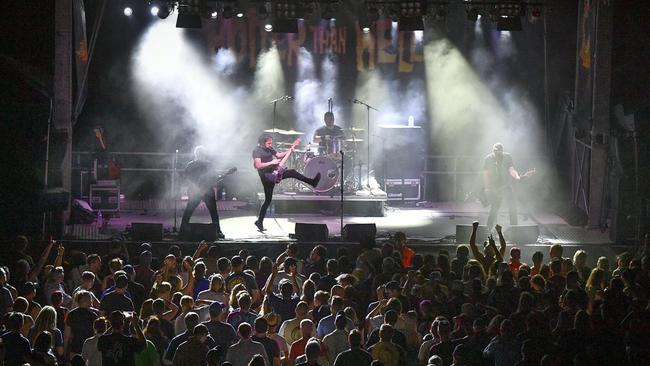
In a separate interview with Review, Larkin – who is himself an accomplished record producer – agrees, while pointing to Spark’s enthusiastic role behind the desk as an integral component of the band’s ongoing hunger for making beautifully brutal new work together.
“We recognised around 10 years ago that there was an aspect of playing music together where we felt that all of our strongest bodies of work reflected a certain approach,” says the drummer.
“We had explored a lot more in terms of what we were capable of as a group through those (older) albums.
“But the maturity in Shihad is saying, ‘But we’re really good at this’,” he says. “Essentially it’s about extreme physicality: it’s playing everything to its absolute maximum, and to think of the live arena, and to provide a soundtrack to that kind of forum – that’s where we feel the best.”
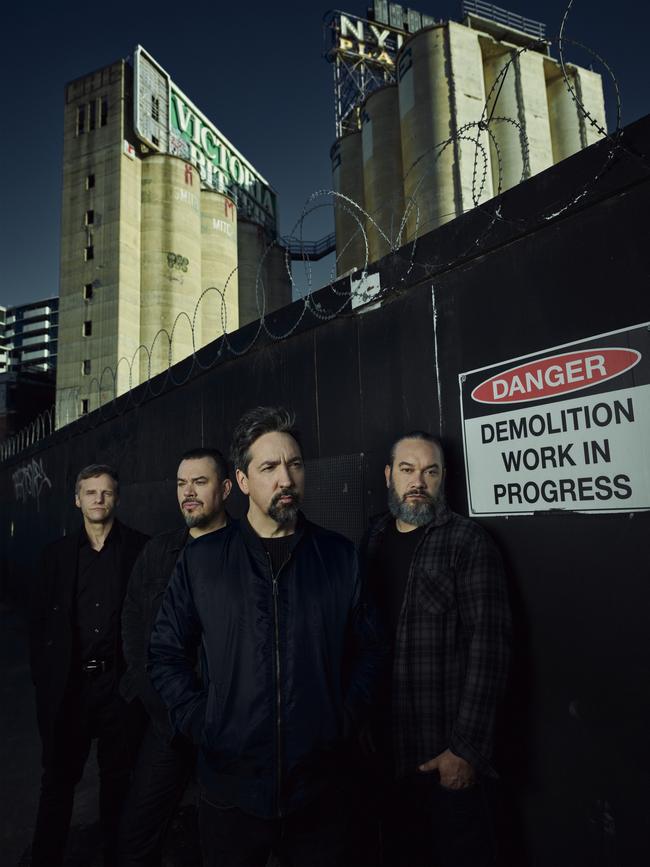
To an unabashed long-term fan such as myself, the real joy of FVEY and its new successor is that these releases come as close as possible to showcasing Shihad in its element: blowing just about every other band in the world off stage through sheer force of will and power of sound.
Repeatedly and loudly playing Old Gods in recent weeks has brought me pure joy amid an otherwise dismal time for the performing arts, with the prospect of interstate – let alone international – touring looking shakier than perhaps at any other point in the pandemic.
But there will come a time when Shihad performs live again, and if you have a love for rock ’n’ roll in your beating heart, you owe it to yourself to be there, witnessing Kiwi Armageddon circa 2022.
Old Gods will be released on September 24 via Warner Music. Shihad’s national tour was to begin on October 1 in Bunbury, WA; rescheduled dates will be announced soon.



